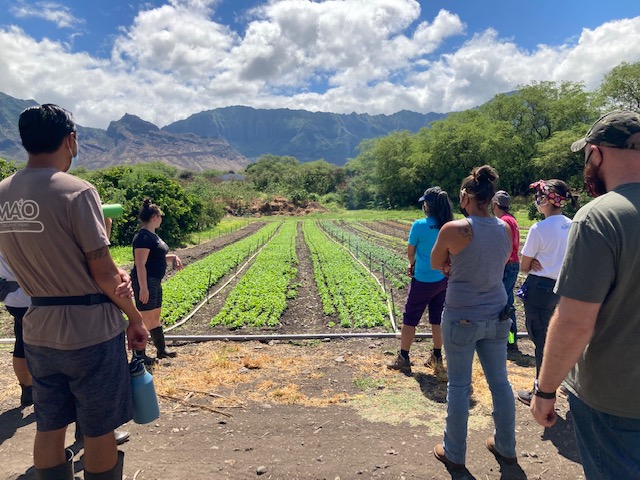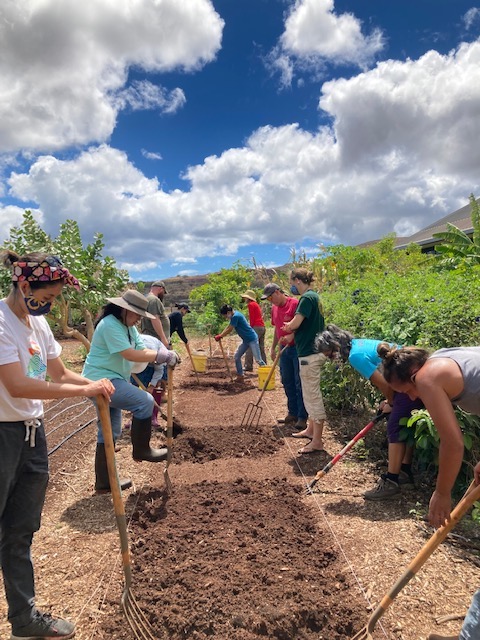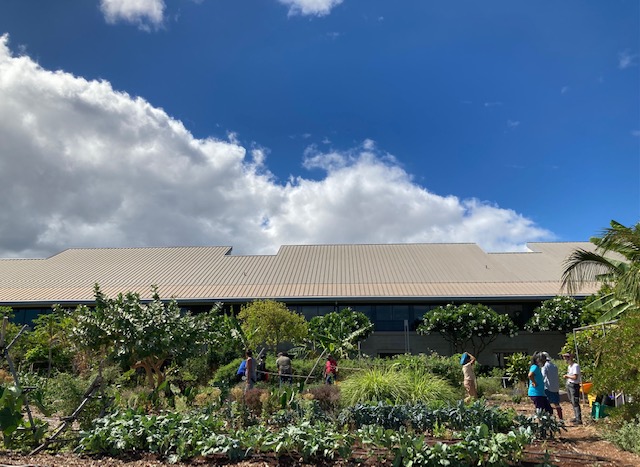The University of Hawaiʻi–West Oʻahu’s Dr. Albie Miles, Assistant Professor of Sustainable Community Food Systems, received a two-year, $300,000 grant from the U.S. Department of Agriculture’s (USDA) National Institute of Food and Agriculture (NIFA).
The USDA’s NIFA announced on July 7 an investment of $6.2 million for 21 Professional Development for Agricultural Literacy grants, part of its fiscal year 2020 competition, that will increase the number of K-14 teachers and educational professionals trained in the food and agricultural sciences, according to a press release.
Miles’ grant is for a project titled, “Aloha ʻĀina Academy: Agricultural Literacy through Sustainable Food Systems Education.” The Aloha ʻĀina Academy professional development (PD) course is geared toward teachers’ professional development in sustainable agriculture and food systems.
“The major goal of the project is to provide high-quality, innovative, and practical learning opportunities for middle and high school teachers that enable them to deliver new courses, content, and programming that fosters the development of students and engaged citizens who are both literate in the FAHN sciences (food, agricultural, natural resources, and human sciences) and inspired to become the next generation of sustainable agriculture and food system leaders in Hawaiʻi, Oceania, and beyond,” Miles said.
The 21 grants are part of NIFA’s Agriculture and Food Research Initiative. Funded projects in this program support best practices in teaching that enhance student learning outcomes.
“As we work to build the talent pipeline for agricultural science, technology and business, we have to reach young people while they are in high school,” NIFA director Dr. Carrie Castille said in a press release. “With this support from NIFA, teachers can develop skills necessary for integrating food and agricultural science into their classes; explore food and agricultural science career paths; and forge mentorships with agricultural professionals, business leaders and university faculty that will help guide the next generation of agricultural scientists and leaders.”
The primary objective of the Aloha ʻĀina Academy is to train and empower teachers with the knowledge, skills, confidence, attitude, and curricular resources to provide instruction in the FANH sciences using a multi-disciplinary approach, Miles said.
The Aloha ʻĀina Academy kicked off last month its summer-fall 2021 professional development course, “The Science of Sustainable Food Systems,” with 32 middle and high school science and agriculture teachers accepted into the program. Course instructors are Dr. Miles and Dr. Koh Ming Wei, ecoliteracy educator with the Center for Getting Things Started.
The hybrid PD course, which runs from June 21 to July 19, includes synchronous online sessions and asynchronous sessions, such as field work in schools, home gardens, and farms, and small-group island farm visits. “The Science of Sustainable Food Systems” continues August through October with monthly webinars, and culminates in November with a hōʻike.


Course themes include:
- Ecological and social issues in agriculture, soil ecosystems and soil quality, and ecological and human health
- Agroecology, soil quality and sustainable agricultural principles and practices: soil fertility, pest and resource management
- Praxis (integrating theory with practice): soil preparation, compost, soil quality assessments
- Food systems: public health, sustainability, social equity and resilience
Miles added that the secondary objective of the Aloha ʻĀina Academy is to create a Hawaiʻi Department of Education-approved agricultural-science course — emphasizing the principles and practices of natural resource sustainability and social equity in the food system — that may be taken by students for high school science credits throughout Hawaiʻi.
“The Aloha ʻĀina Academy: Agricultural Literacy through Sustainable Food Systems Education is part of a larger education initiative in the state to develop a well-resourced Higher Education Pathway in Sustainable Food Systems,” Miles noted.
The objective of the Higher Education Pathway in Sustainable Food Systems is to increase the number, retention, and graduation rates of Native Hawaiian and other underrepresented students in the FANH sciences by utilizing experiential and problem-based learning that connects students to traditional food ways, sustainable farming practices, and agroecological knowledge, he said.
“The key long-term outcome of the Aloha ʻĀina Academy is to develop student competencies for higher education and the workforce serving the FANH sciences system,” Miles said. “Specifically, the Aloha ʻĀina Academy will empower teachers as multi-disciplinary science instructors, and prepare students for college and careers in the FANH sciences as an integral part of green workforce development and food system change.”

